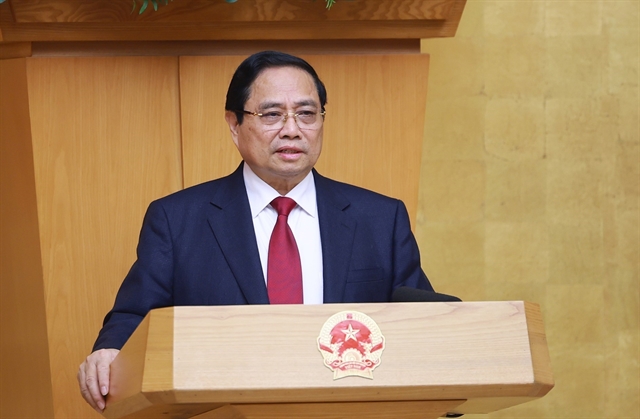 Politics & Law
Politics & Law

 |
| Việt Nam's Prime Minister Phạm Minh Chính on June 8 meets with Jordanian King Abdullah II ibn Al Hussein on the sidelines of the 3rd United Nations Ocean Conference (UNOC 3) in Nice, France. VNA/VNS Photo Dương Giang |
HÀ NỘI — Building on 45 years of strong relations between Việt Nam and Jordan, an official visit to Việt Nam from November 12-13 by King Abdullah II ibn Al Hussein of the Hashemite Kingdom of Jordan is expected to mark a historic milestone in the bilateral ties, ushering in a new phase of partnership and creating a foundation for enhanced cooperation in areas of shared interest.
According to the Vietnamese Ambassador to the UAE and Jordan, Nguyễn Thanh Diệp, this is the first-ever visit to Việt Nam by the King of Jordan, and the first head-of-state/government-level exchange between the two countries since their diplomatic ties were established. It is also the first trip by a leader of a Middle Eastern state to Việt Nam in nine years.
In previous meetings with Vietnamese leaders, the King expressed deep admiration for Việt Nam and its people, emphasising his special affection for the Southeast Asian country and his long-standing desire to visit the nation.
The visit coincides with the 45th founding anniversary of diplomatic ties between Việt Nam and Jordan (August 9, 1980 – 2025), offering an opportunity to usher in a new chapter of partnership and create momentum to advance cooperation in mutually beneficial areas.
During his stay, the King is scheduled to hold talks with State President Lương Cường, witness the signing of several cooperation documents, meet with other key leaders of Việt Nam, deliver a speech at a Vietnam–Jordan business forum and attend a textile industry roundtable. He will also lay a wreath at the monument dedicated to war heroes and martyrs on Bắc Sơn Road, as well as pay tribute to President Hồ Chí Minh at the mausoleum in Hà Nội.
Since the establishment of diplomatic relations, the Việt Nam–Jordan ties have steadily developed and strengthened. The two countries have maintained several high-level visits and exchanges, including Deputy Foreign Minister Phạm Quang Hiệu’s trip to Jordan in December 2022, Prime Minister Phạm Minh Chính’s meeting with Crown Prince of Jordan Al Hussein bin Abdullah II during the 8th annual edition of the Future Investment Initiative (FII8) Conference in Saudi Arabia in October 2024 and others.
Recently, during a meeting with the Jordanian King at the third United Nations Ocean Conference (UNOC 3) in Nice, France, in June, PM Chính affirmed that Việt Nam attaches importance to multifaceted cooperation with Jordan. Meanwhile, King Al Hussein expressed admiration for Việt Nam’s socio-economic achievements and strong progress. The two sides agreed to strengthen delegation exchanges at all levels to further enhance political trust and explore negotiations and cooperation agreements on trade, investment, and other areas.
The two nations have recorded progress in their economic and trade cooperation, with their two-way trade reaching approximately US$190 million in 2024. They are set to lift trade turnover to $500 million by 2030 and $1 billion by 2035.
The two sides have expanded cooperation in food security and the Halal sector, including workforce training, production, processing, packaging, distribution, and mutual recognition of Halal certification. They have also enhanced education-training cooperation and developed high-quality human resources in information technology, artificial intelligence, digital transformation and green energy.
As of late September, Jordan had five active investment projects in Việt Nam, with a total registered capital of $1 million, ranking 108th out of 153 countries and territories investing in the Southeast Asian nation.
According to Ambassador Diệp, Jordan, and the Middle East in general represent a potential market for Vietnamese businesses. To succeed in the region, companies first need to understand local Islamic culture and business customs. Religion, traditions, and Islamic culture are highly respected, therefore businesses should avoid products, images, or communication that may be religiously sensitive, and place strong emphasis on personal relationships and trust.
He stated that moving forward, the two sides should continue close coordination and mutual support in international forums and organisations; step up partnership in food security and Halal industry, and boost tourism promotion - the areas with great promise for both countries.
At the same time, businesses of both nations should strengthen their presence by promoting products and joining trade fairs in Dubai of the UAE, Riyadh in Saudi Arabia, and Doha in Qatar, such as Gulfood, Arab Health, Big 5 and ADIPEC, to seek potential partners.
To gain a competitive edge, investment should prioritise sectors aligned with regional demand, including agricultural products, food, Halal products, aquaculture, construction materials, consumer goods, textiles, renewable energy, logistics, information technology, and skilled labour. Companies must also manage risks and payments carefully, avoid unclear intermediaries, and thoroughly verify partners’ credibility before setting up cooperation, the diplomat said.
Diệp expressed his hope that bilateral relations will see breakthroughs in all areas in the near future, with the two countries enhancing delegation exchanges at all levels, and continuing close coordination and mutual support at international forums and organisations. VNA/VNS